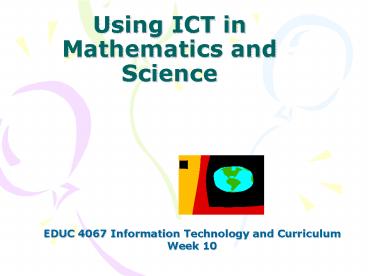Using ICT in Mathematics and Science - PowerPoint PPT Presentation
1 / 14
Title:
Using ICT in Mathematics and Science
Description:
... is the process by which scientists, collectively and over time, endeavour to ... The two principal characteristics of a computer are: ... – PowerPoint PPT presentation
Number of Views:392
Avg rating:3.0/5.0
Title: Using ICT in Mathematics and Science
1
Using ICT in Mathematics and Science
- EDUC 4067 Information Technology and Curriculum
- Week 10
2
What is Science?
- Process?
- Content?
- Skill?
- Scientific Method is the process by which
scientists, collectively and over time, endeavour
to construct an accurate (that is, reliable,
consistent and non-arbitrary) representation of
the world.
3
Scientific Method
- 1. Observation and description
- 2. Formulation of an hypothesis
- 3. Predict quantitatively the results of new
observations. - 4. Performance of experimental tests
4
What is a Computer?
- A programmable machine. The two principal
characteristics of a computer are - It responds to a specific set of instructions in
a well-defined manner. - It can execute a prerecorded list of instructions
(a program).
5
Science Curriculum in SA
- SACSA frameworks for Science and ICTs
- Middle school science competency
- ICT skills in middle school
- High school science competency
- ICT skills in high school
6
Using ICT in Science
- Calculation devices
- Computer programs for science?
- Observation devices
- Searching for information
- Collaborate with other scientists
- Computer modelling
7
Science Education Goals
- Emphasizing Inquiry
- Scientific Literacy
- Understanding Science concepts
- Integrating IT to support science teaching and
learning
8
Emphasizing Inquiry
- Collection and analysis of Data
- Use of probes (hardware) and programs (software)
for analysis - WEB cams for biology observation
- pH meters for soil or water
9
Scientific Literacy
- Students are curious about everyday experiences.
- The internet and searching websites
- Some internet sites are inappropriate or
inaccurate. - Use search strategies such as WEB QUESTS
10
Science web quests
- http//www.unisanet.unisa.edu.au/11788/sandm2/weba
ct.htm - http//science.uniserve.edu.au/school/tutes/webque
st/sciwebqu.html - http//www.ed-dev.uts.edu.au/teachered/edtech/webq
uests.html - http//www.what-is-the-speed-of-light.com/webquest
s/science-webquests-index.html
11
Science Simulations
- http//www.livinggraphs.com/enu/
- http//www.froguts.com/flash_content/index.html
12
Using ICT in mathematics learning
- Motivating drill and practice
- Concretising the abstract
- Fostering mathematical problem solving
- Supporting communication
13
Logo
- http//www.softronix.com
- Programming language designed for young children
- Mathematics and problem solving
- The only language underpinned by educational
theories
14
- http//www.mathcats.com/contents.html
- Some well crafted materials at
- Mrs Glossers Maths Goodieshttp//www.mathgoodie
s.com/e.g., Java enabled puzzleshttp//www.math
goodies.com/puzzles2004/ - Wonderful little factor tree manipulative
athttp//nlvm.usu.edu/en/nav/index.html - Beautiful Platonic solids(drag and
rotate)http//www-sfb288.math.tu-berlin.de/vgp/co
ntent/solids/PaPlatonic.html





![[PDF] Crocheting Adventures with Hyperbolic Planes: Tactile Mathematics, Art and Craft for all to Explore, Second Edition (AK Peters/CRC Recreational Mathematics Series) Android PowerPoint PPT Presentation](https://s3.amazonaws.com/images.powershow.com/10090762.th0.jpg?_=20240802079)

























